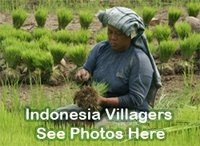 Memorial day at the theme of human rights across the world on 10-Dec 2006 to 10 December 2007 to come is "Perangi Poverty." Long before it was discussed at international conferences in various high-level world of poverty reduction. To the UN World Food KTT (World Food Summit) in 2002 in Rome, believes that achieving the millennium development goals (Millennium Development Goals), to reduce half the world's poor population by 2015 will not be achieved.
Memorial day at the theme of human rights across the world on 10-Dec 2006 to 10 December 2007 to come is "Perangi Poverty." Long before it was discussed at international conferences in various high-level world of poverty reduction. To the UN World Food KTT (World Food Summit) in 2002 in Rome, believes that achieving the millennium development goals (Millennium Development Goals), to reduce half the world's poor population by 2015 will not be achieved.Major indication of poverty can terkurangi is terbebasnya the earth's population from hunger or the availability of healthy and nutritious food are adequate. More than 800 million people currently lack food and more than 1 billion people live on less than 1 Dollar a day.
In Indonesia, towards the end of 2006 to early February 2007, the news about food shortages and increase the price of rice - the staple food of the people who cause the poor can not afford them - to have to eat rice aking (the rest of the dried rice to be cooked again), as if buried by santernya news about natural disasters and accidents. While the threat of hunger is also one of main factors that death is not less important to the disaster, such as edema going hungry NTB early 2006, when this area including the main areas of food (rice barn) in Indonesia.
Food Rights
The right to food as a long-declared human rights (human rights) through the various international agreements. Of them; the Universal Declaration of Human Rights (DUHAM) or the UDHR, 1948, says "Everyone has the right to a standard of living adequate for the health and well-being of himself and of his family, including food ..." Article 25 (1)
The establishment of the Constitution of FAO, the International Covenant Rights Economic Social and Cultural (ECOSOC Right) or the ICESCR, in 1966, bunyinya "The States Parties to the present Covenant recognize the right of everyone to an adequate standard of living ... including adequate food ... "and agree to take appropriate steps to realize this right. Article 11 (1) Dan RDWFS, 1996, bunyinya "We, the Heads of State and Government ... reaffirm the right of everyone to have access to safe and nutritious food, consistent with the right to adequate food and the fundamental right of everyone to be free from hunger. "All international agreements are essentially ensure that everyone entitled to a decent food and healthy .
International agreements have been diratifikasi by the Indonesian government, especially ICESCR (ECOSOC Right) which is the main basis terpenuhinya the right food, because in it there right to food. However, what happens? Ratification ratification seems to be living as a monumental international recorded on a sheet only. Reality in the field very far from the intention behind the agreement signed in ditanda international level. It can be used as sweetener that Indonesia has been considered to respect the human rights in the eyes of the world with ratifying various human rights konvenan declared that, as this will become a profitable and conditions when making the role of Indonesia negoisasi-level negotiations in various international interests.
Conditions have not diterapkannya various konvenan human rights in Indonesia, although already diratifikasi can still be with the bawdy-marutnya condition of food security in Indonesia. Very often we are still in with a variety of communication media that the community does not terpebuhi keputuhan most basically, the food.
Konvenan-konvenan ratification of international human rights in Indonesia translated in laws and regulations; Law No. 7, 1996, About Food, bunyinya "Resilience is the condition terpenuhinya food food for the household is reflected in the availability of adequate food, and the number of good quality, safe , equitable, and affordable. "(Article 1 number 17). The establishment of the Board of the National Food President Degree No.. 132 in 2001 and published No PP. 68, 2002, on food, bunyinya "To achieve food security carried out the formulation of policy, evaluation and control of food security" (Article 17).
Every form of human rights are always accompanied with the obligation or responsibility of the state in three levels, namely to respect (to respect), protect (to protect), and fulfilling (to fulfill). Likewise with the right to food. That means that when a country has ratified konvenan Human Rights declared in the international governance of a country must meet what is meant in diktum-diktum international is intended to protect and secure the conditions for protected human rights or the rights asasinya basically.
Although many agreements have been in the international and national level that set about this, but the right to food constantly denied her by various parties who feel aggrieved by the existence of the agreement and these regulations, especially multinational companies, such as trans national corporations and multi-national Corporation ( TNCs / MNCs) through various conferences and international forums. More concern, the food at this time is seen as merely commodities trading, commodities are not regarded as social conditions as the main prop of human life. The same object or commodity which is the social support main food availability of raw materials, namely land, where all food comes vegetable plants that are planted in fertile soil. Social land object is also being disetir by the designer so that global trade can be the object of land international trade, for that we must wonder land certification program with low cost Prona program funded by the World Bank. Although this program is very helpful for the poor who can not afford menyertifikasi land, but on the other the more we eat land certified the more easily we also sell them.
Selling land is not the only literal meaning to sell it, but many aspects of the so-called sell, can we land mengagunkan letter to the bank as collateral when we borrow money in the bank, and when we are not able to pay the land will be confiscated. From these assumptions, we must also eventually wonder why the poor are also now forced to have a credit card? One hand the foreign banks have the obligation to contribute to the community credit, but it is the obligation set by the state is to micro-small business, not for the consumer.
Pull-interest in international trade negotiations dikomandoi by the World Trade Organization (WTO) agreement on agriculture (Agrement on Agriculture - AoA) and the right to intellectual ownership-related trade (TRIPS) many be gazed at by the international civil society, because it will strengthen the control TNCs / MNCs and steer farmers and fishermen against their sovereignty over genetic resources.
How the fate of farmers tercuranginya developing countries and poor countries do not receive subsidies because the cost of agricultural production, do not get protection from the state, does not get attention from the main keberpihakan and the policies of the state was born. On the other hand, markets developed countries do not also support for developing country agricultural products and poor countries enter into commodities in the brisk market for protection from their country that does not go for reasons of quality, sustainability and quality of quantity. While developed countries agricultural products are now flooding the market and the poor developing countries. More ironic, more developed countries, which now does not consume rice and rice they produce a surplus, only for the purposes of trade only benefits the estuary. Farmer also receive subsidies and incentives-incentives over from the country. This be gazed at by the farmer organization and civil society to remove the agricultural affairs of the WTO agenda and the WTO failed to agree on rules for international agriculture (AoA) has been discussed even more since 5 years ago, since the Doha round.
The factors
Substantial cause of food shortages occurred because, 1). The availability of land for farmers who continue to tighten due to the conversion of agricultural land to large plantations, the expansion of cities, settlements and land expropriation in the past. 2). Regeneration of farmers, farmers, professionals no longer a matter of noble and can boast as many people to give food, but farmers will be seen as a dirty profession belepotan mud and not menjajikan to become prosperous, let alone rich. 3). Penyeragaman staple food, the old, traditional Indonesian recognize different types of staple foods, such as an area in Sulawesi eat sago, a food area in Garut district, and one in Papua eat tubers. 4). Destruction wisdom traditional local food system, such as mow the village has ever exist in the past, in the various regions in Indonesia. 5). Policy that does not stand on the farmers. 6). Protection and agricultural subsidies is not a priority for the Indonesian government, as an agrarian country. 7). The price of tools and material production facilities that are not balanced with the value of selling agricultural products.
Powerful Moment in the Long Term
The steps that need to be together, (of course), especially as the government authorities is a policy; 1). Agrarian reforma done immediately, as planned and the government through the National Land Agency (BPN) akan me-redistrbusi 8.15 million hectares of land, with the condition no longer chop forest that has been very low. 2). Pencitraan a good profession to the farmers through various media campaigns and education-formal and non formal. 3). Bring back diversity to ethnic food main / regions have a history of non-staple food rice. 4). Bring back the system of sovereignty, such as traditional food village rice barns. 5). Create policies that stand in the farmers and policy-revision kenijakan that are not aligned. 6). Make pengutamaan protection and subsidies in agriculture, particularly on food crops. 7). Make a fair trade price with the balance of production facilities with the price of agricultural production to keep the range margin, or profit that should have obtained sufficient farmers.
Of course the above is done in stages and will take a long time. However, if applied with consistency, would akan hunger can be overcome.
Iswan Kaputra
Deputy Director BITRA Indonesia Members of the Coalition for Food Kedaulatan (KRKP) National












Tidak ada komentar:
Posting Komentar